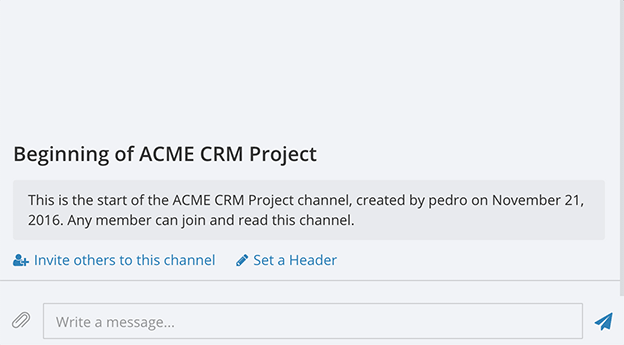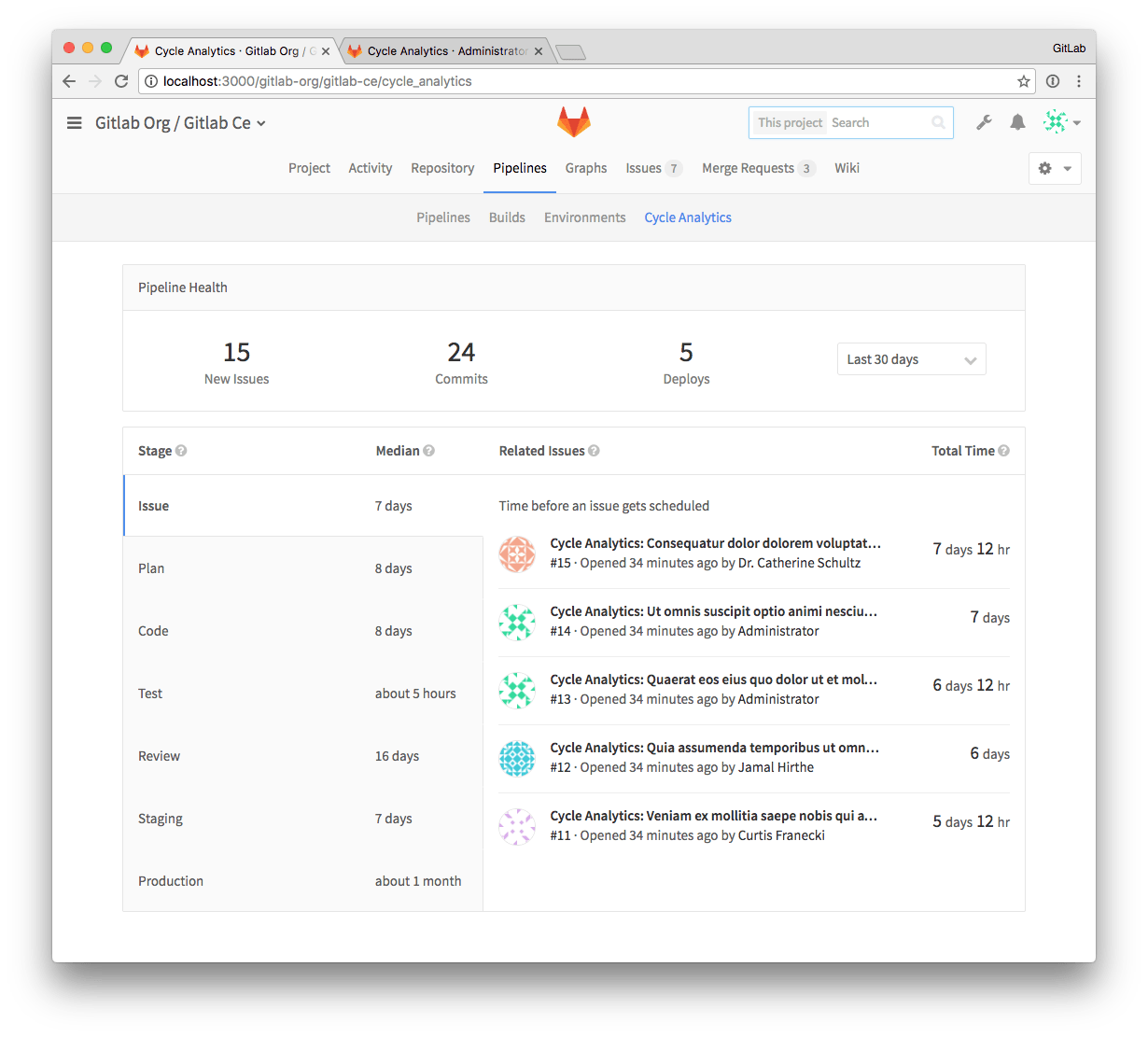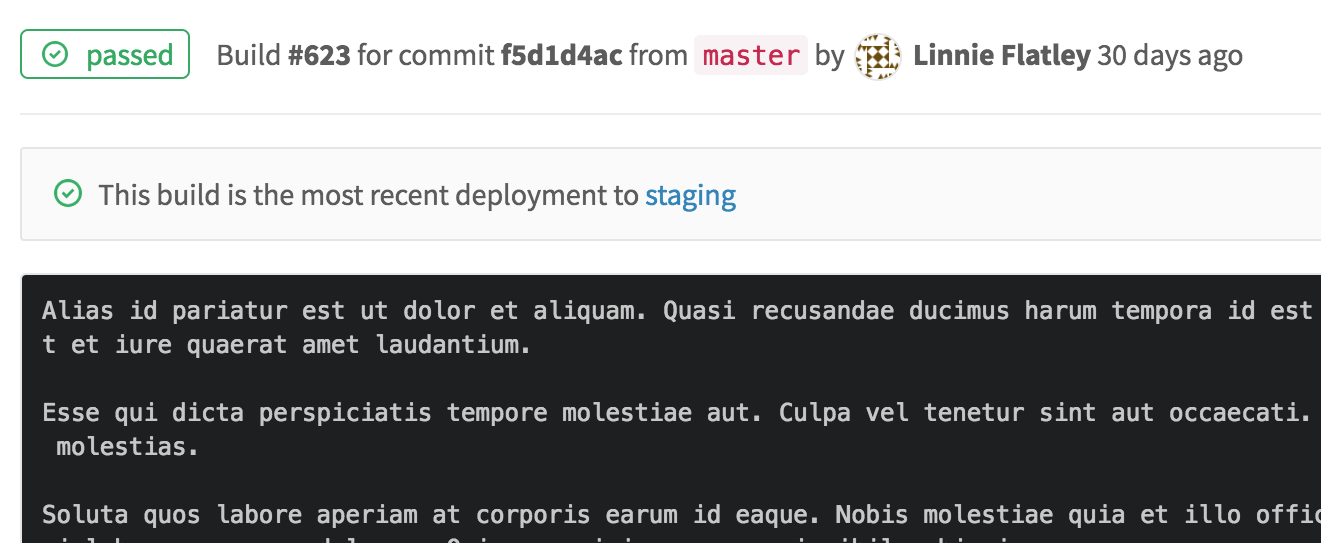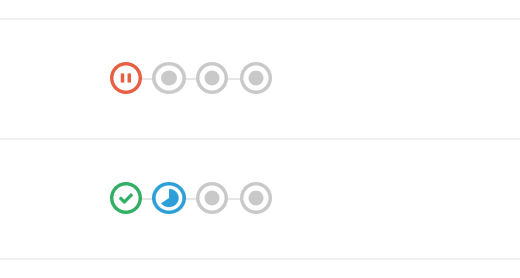You're doing code review of a new feature and wonder how it'll actually feel, look and work when it's live. Yesterday, you had to sacrifice your local development environment's state, checkout the remote branch, run migrations, and then spin up the entire development environment. Today, you can just go to GitLab and click the link in the merge request to play with a fully functional, live environment.
Maybe you have some feedback on what you saw and start talking with your colleague on chat. Rather than having to communicate on who moves the result to issues, you just create an issue directly from chat. You can immediately add a time estimate to the issue and anyone peeking at the cycle analytics will see the new issue come by and over time, move to production, giving you feedback on where things might get stuck.
You can do all of the above and much more with GitLab 8.14, today. Time tracking, Review Apps, Chat commands, Cycle Analytics improvements and much more.
This month's Most Valuable Person (MVP) is Toon Claes. Toon contributed the button to delete all merged branches, a great addition to GitLab. Thanks Toon Claes!
Tune in on Nov. 30 for our 8.14 release webcast with a live demo of Review Apps and Time Tracking for EE! Register here!
Time Tracking Beta (EE)
Whether you're a contractor that needs to keep track of their time, or you're managing time spent on issues and projects, time tracking has traditionally been a painful experience: You have various systems to keep track or log your time and these never seem to fit in your day-to-day workflow.
You can now track your time right where you're working, with Time Tracking in GitLab.
With Time Tracking, you're able to set estimates for how much time is necessary for a particular issue. All you have to do is use a new slash command, which can be entered in the issue description or a comment:
/estimate 6h
You can adjust this at any time with the same command. Once you've spent time on an issue, you can log this simply with:
/spend 3h
You'll see this reflected in the interface.

Time Tracking is made available as trial to all our Enterprise Edition customers during the beta period, after which it becomes available as a paid Product.
We're interested in hearing how we can improve time tracking to fit your workflow. Let us know by creating an issue or below in the comments.
Some things we're thinking about: reporting, an API, Time Tracking in Issue Boards and others.
Chat Commands (experimental)
It seems like communication has moved from the conference room to the online chatroom in the last few years. In particular, collaboration and idea generation seem to happen here, and that's an important part of the idea-to-production vision that we aim to capture with GitLab. With Chat Commands you can now bridge the gap between chat and GitLab's repositories, issue tracker, and CI/CD pipelines quickly and easily.

With this first iteration, you can quickly create or view an issue, for instance, using this to make an issue with the title and description already filled in:
/gitlab issue create Even Better Issue Boards
Let's make Issue boards _even_ better!
You can also embrace ChatOps and trigger deploys to production (using the proper identity and permissions of the user):
/gitlab deploy staging to production
This iteration supports Mattermost, which ships with GitLab Omnibus. Slack support is coming soon. The command set is limited, but we're looking to add more soon and would love your feedback.
Review Apps
Review Apps are the future of reviewing work. Rather than just looking at code, Review Apps will serve you with a fully functioning environment in which your app is running, ready for any kind of testing, trying or poking.
We initially offered experimental support for Review Apps in GitLab 8.12, and improved it in the 8.13, but today we're shipping the last bit to call it "complete".
Now with Review Apps properly set up, an app will spin up automatically for each branch and be destroyed automatically when the branch is removed from GitLab. We're using it with this blog, and it's awesome. This feature is so exciting, there's a whole other blog post about it.
Cycle Analytics Events
With Cycle Analytics you get actionable feedback on how fast your ideas are moving to product and where they might be getting stuck. This can seem a little abstract, so to make it more obvious what is happening, we'll now show you the latest events in each stage.

This should make it easier to get an overview of what is happening in each stage, but also to quickly jump in and see if you can move things forward faster.
Prevent merge until Review is done
You shouldn't merge code before all tests have passed and review is done. The first was enforceable for a while in GitLab, but the second not yet.
With GitLab 8.14, you can now prevent merges until all discussions on a merge request have been resolved. This makes it impossible to miss those last comments on the bottom of the page (even if we didn't have that handy widget on top) and make sure only code that has been checked and verified makes it to production.

Enable this option in the project settings.

Thanks to Rodolfo Arruda for contributing this awesome feature!
Delete all Merged Branches
Toon Claes contributed an amazingly obvious, yet dubiously missing feature: a single button to quickly delete all merged branches in GitLab.
We'll make sure to confirm your choice and then quickly set off a process to do as requested. Find the button under your project's Repository ➔ Branches.

Deleting all merged branches will not delete any of your protected branches.
Thanks Toon Claes!
Subscribe to Group Labels
We've introduced the convenient Group Labels in GitLab 8.13.
You can now finally subscribe to them, so you get notified on things that
matter to you, across entire groups. For instance, get notified whenever
a new issue is made with the customer label, so you'll get a good overview
of customer issues across all projects in a group.
Better Pipeline emails
Now when a pipeline fails, we'll email you what went wrong, so you know whether to simply retry a build, or call for all-hands-on-deck, without having to dive into the logs immediately.

JIRA integration improvements
We know many of you use JIRA intensively. We're working very hard on improving GitLab's integration with it. Below are some of the improvements we've made this release. We're interested in hearing what else.
Remote issue links to JIRA
To make it super easy how a JIRA ticket relates to commits in GitLab, now
whenever you mention a JIRA ticket in a commit or merge request,
we'll add it to the remote issue links in the ticket. You can write
that it Fixes a JIRA ticket or just mention it and we'll make sure
it appears correctly.

Related MR: https://gitlab.com/gitlab-org/gitlab-ce/merge_requests/7413
A more silent GitLab in JIRA
When you set up the JIRA service within GitLab, by default, every commit and merge request in GitLab that referenced a JIRA issue created a comment in this issue in JIRA. Some people like having the complete details of what's going on, others prefer this to be more silent.
With GitLab 8.14, you can now disable the creation of comments when referencing a JIRA issue in a commit or in a merge request.
Improved Looks!
GitLab also got prettier and easier to use with 8.14, some highlights below:
You can now see who you are mentioning:

Pipelines and the meta information are looking even better than they did:

We now show you environment information on the build page:

Pipelines will now show whether specific builds are skipped:

And we made it easier to see what is left in the current pipeline:

Improved Accessibility
Our amazing UX and frontend teams have been working hard on improving the accessibility of GitLab. We've made a few changes worth highlighting this month:
- We've added a 'Skip to Content' button when tabbing, This allows you to reach the content faster and skip navigation items.
- All dropdowns, buttons and anchors now have focus states
- We've increased the contrast between background and anchors
We're always interested in hearing how we can improve GitLab's accessibility further.
GitLab Mattermost 3.5
GitLab 8.14 includes Mattermost 3.5, an open source Slack-alternative whose newest release offers improved performance on mobile and web through reduced loading times, mobile UI improvements and faster server-side processing, Minio as a self-hosted S3-alternative to local file storage, Russian language translation, favorite channels and much more.
This version also includes security updates and upgrade from earlier versions is recommended.
GitLab Runner 1.8
We are also releasing GitLab Runner 1.8 today. Most interesting changes:
- Add initial Prometheus metrics server to runner manager !358
- Add support for docker registries on non standard ports !376
- Use correct constant for kubernetes resource limits. !367
- Add PullPolicy config option for kubernetes !335
- Fix/unplug stalled endpoints !390
- Fix {Bash,Cmd,Ps}Writer.IfCmd to escape its arguments !364
Support for private container registries in GitLab CI builds
In GitLab 8.14 and GitLab Runner 1.8 we've improved support for private docker images.
From now on you can use private/protected images stored in GitLab's Container Registry automatically, without any changes. GitLab will send registry credentials with build data, and Runner will use them to authorize docker pull requests.
You can also use DOCKER_AUTH_CONFIG Secure Variable to add credentials
for other private registries. Thanks to this you can use any image from any registry - public or private - which is accessible from build's host, to be a base of your build or a service used by it.
Runner 1.8 fixes also the mechanism that is generating aliases from service name, when registry is available on non standard port.
You can read more about private container registries support in GitLab Runner's configuration documentation.
Performance Improvements
- Commits that are pushed are now processed in a separate Sidekiq worker: !6802
- The authorised projects for a user are now stored in a dedicated database table. This list is updated whenever you are granted access to a new project, project access has been removed, etc: !6839
- Defer saving of project services to reduce database queries: !6958
- Getting the merge requests that close an issue now uses a cache: !6996
- Queries to get events have been optimised by removing the default ORDER BY where possible: !7130
- GitLab can now limit the amount of Sidekiq workers per queue to a certain percentage: !7292
- An index has been added for
project_import_data.project_idto improve finding project import data: !7316 - Certain database associations are now eager loaded on the merge requests and issues index pages: !7564
- Refreshing of caches upon a push has been improved. Previously GitLab would refresh all caches, starting with 8.14 it will only refresh the caches of data that has been changed: !7360
Omnibus GitLab package changes
Redis in HA configuration
In GitLab 8.11 we've announced experimental Redis Sentinel support. We've improved this further and also introduced ways of configuring Redis HA, all within the package.
With Omnibus GitLab 8.14 Enterprise Edition package, you can fully configure Redis in Highly Available configuration which also includes configuring Redis Sentinel. This is a step forward in the direction of having a fully HA ready Enterprise Edition package.
When using the Community Edition package, Redis Sentinel needs to be installed and configured manually separately.
Omnibus GitLab packages on OpenSUSE
With GitLab 8.14 we are introducing omnibus-gitlab packages for OpenSUSE 13.2 and 42.1. The packages are served through zypper repositories from our package server.
Go to our download page for installation details.
Package repositories for Oracle Linux and Scientific Linux
Omnibus GitLab packages for Oracle Linux and Scientific Linux have been supported for a long time however, they required a manual change in the yum repo list. Starting with GitLab 8.14, this is no longer necessary and you can use the directions from our download page without any alterations.
Further Omnibus Package changes
- Packaged NGINX is upgraded to 1.10.2
- Packaged Redis is upgraded to 3.2.5
- Multiple configuration options got introduced in the gitlab.rb file
- See omnibus-gitlab Changelog for more details
Other changes
This release has more improvements, including security fixes. Please check out the changelog to see all the named changes.
Upgrade barometer
To upgrade to GitLab 8.14, about 15 to 30 minutes downtime is required depending on the size of your instance. See below for details.
- The column
application_settings.repository_storagehas been renamed, this requires downtime but takes very little time - Some indexes with stricter constraints are being added and they require corresponding code changes to be deployed, this requires downtime
- The subscriptions data is being migrated in a way that can't be done online, this process may take a few minutes
- Project records with invalid visibility level are fixed, this can take a few minutes and requires downtime
Note
We assume you are upgrading from the latest version. If not, then also consult the upgrade barometers of any intermediate versions you are skipping. If you are upgrading from a GitLab version prior to 8.0 and you have CI enabled, you have to upgrade to GitLab 8.0 first.
Please be aware that by default the Omnibus packages will stop, run migrations,
and start again, no matter how “big” or “small” the upgrade is. This behavior
can be changed by adding a /etc/gitlab/skip-auto-migrations
file.
Installation
If you are setting up a new GitLab installation please see the download GitLab page.
Updating
Check out our update page.
Enterprise Edition
The mentioned EE only features and things like LDAP group support can be found in GitLab Enterprise Edition. For a complete overview please have a look at the feature list of GitLab EE.
Access to GitLab Enterprise Edition is included with a subscription. No time to upgrade GitLab yourself? A subscription also entitles you to our upgrade and installation services.

We want to hear from you
Enjoyed reading this blog post or have questions or feedback? Share your thoughts by creating a new topic in the GitLab community forum.
Share your feedback